A PRACTICAL APPROACH TO SPEED UP NPSHR PREDICTION OF CENTRIFUGAL PUMPS USING CFD CAVITATION MODEL
- 格式:pdf
- 大小:893.26 KB
- 文档页数:10
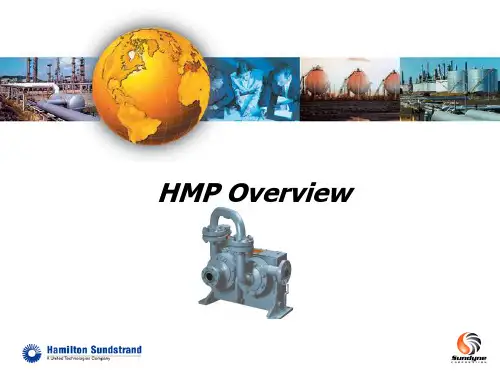
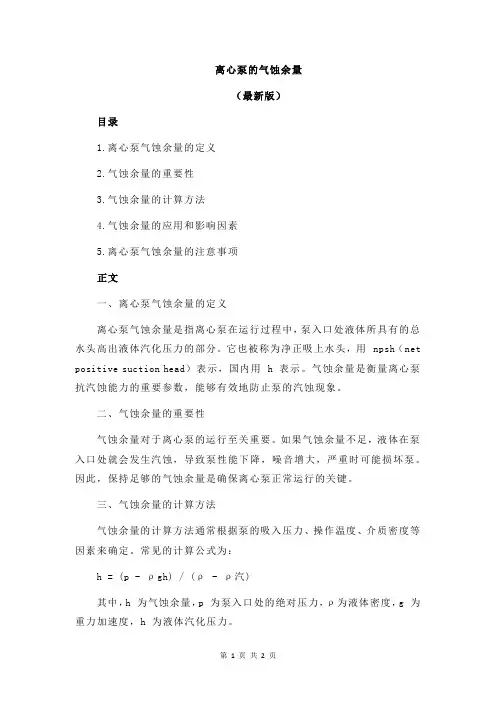
离心泵的气蚀余量(最新版)目录1.离心泵气蚀余量的定义2.气蚀余量的重要性3.气蚀余量的计算方法4.气蚀余量的应用和影响因素5.离心泵气蚀余量的注意事项正文一、离心泵气蚀余量的定义离心泵气蚀余量是指离心泵在运行过程中,泵入口处液体所具有的总水头高出液体汽化压力的部分。
它也被称为净正吸上水头,用 npsh(net positive suction head)表示,国内用 h 表示。
气蚀余量是衡量离心泵抗汽蚀能力的重要参数,能够有效地防止泵的汽蚀现象。
二、气蚀余量的重要性气蚀余量对于离心泵的运行至关重要。
如果气蚀余量不足,液体在泵入口处就会发生汽蚀,导致泵性能下降,噪音增大,严重时可能损坏泵。
因此,保持足够的气蚀余量是确保离心泵正常运行的关键。
三、气蚀余量的计算方法气蚀余量的计算方法通常根据泵的吸入压力、操作温度、介质密度等因素来确定。
常见的计算公式为:h = (p - ρgh) / (ρ - ρ汽)其中,h 为气蚀余量,p 为泵入口处的绝对压力,ρ为液体密度,g 为重力加速度,h 为液体汽化压力。
四、气蚀余量的应用和影响因素气蚀余量在离心泵选型、设计和运行过程中具有重要作用。
在选型时,需要根据输送介质的特性和泵的工况条件,选择具有合适气蚀余量的泵。
在设计时,需要根据泵的工作条件,合理确定泵的结构和参数,以保证足够的气蚀余量。
在运行过程中,需要根据泵的实际工况,调整泵的运行参数,确保气蚀余量满足要求。
气蚀余量的影响因素主要有:液体的物理性质(如密度、粘度、汽化压力等)、泵的结构和参数(如叶轮形式、叶片数、泵转速等)、泵的运行条件(如吸入压力、流量、温度等)等。
五、离心泵气蚀余量的注意事项为确保离心泵的正常运行,应注意以下几点:1.选择合适的泵:在选型时,应根据输送介质的特性和泵的工况条件,选择具有合适气蚀余量的泵。
2.合理设计:在设计时,应根据泵的工作条件,合理确定泵的结构和参数,以保证足够的气蚀余量。
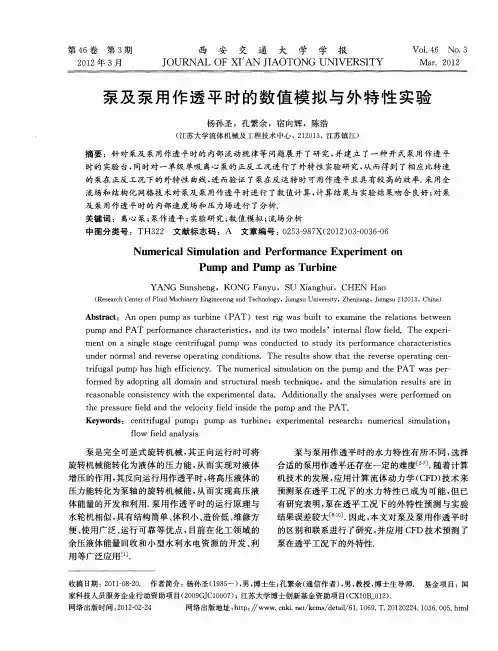
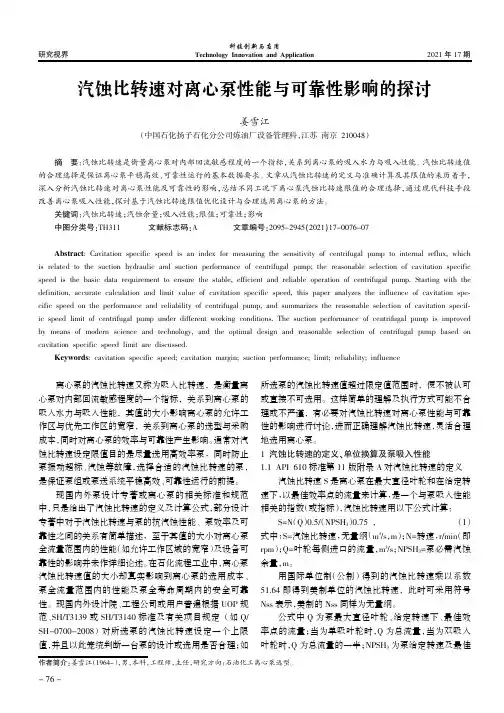
汽蚀比转速对离心泵性能与可靠性影响的探讨姜雪江(中国石化扬子石化分公司炼油厂设备管理科,江苏南京210048)离心泵的汽蚀比转速又称为吸入比转速,是衡量离心泵对内部回流敏感程度的一个指标,关系到离心泵的吸入水力与吸入性能,其值的大小影响离心泵的允许工作区与优先工作区的宽窄,关系到离心泵的选型与采购成本,同时对离心泵的效率与可靠性产生影响。
通常对汽蚀比转速设定限值目的是尽量选用高效率泵,同时防止泵振动超标、汽蚀等故障,选择合适的汽蚀比转速的泵,是保证泵组或泵送系统平稳高效、可靠性运行的前提。
现国内外泵设计专著或离心泵的相关标准和规范中,只是给出了汽蚀比转速的定义及计算公式,部分设计专著中对于汽蚀比转速与泵的抗汽蚀性能、泵效率及可靠性之间的关系有简单描述,至于其值的大小对离心泵全流量范围内的性能(如允许工作区域的宽窄)及设备可靠性的影响并未作详细论述。
在石化流程工业中,离心泵汽蚀比转速值的大小却真实影响到离心泵的选用成本、泵全流量范围内的性能及泵全寿命周期内的安全可靠性。
现国内外设计院、工程公司或用户普遍根据UOP规范、SH/T3139或SH/T3140标准及有关项目规定(如Q/SH-0700-2008)对所选泵的汽蚀比转速设定一个上限值,并且以此笼统判断一台泵的设计或选用是否合理;如所选泵的汽蚀比转速值超过限定值范围时,便不被认可或直接不可选用。
这样简单的理解及执行方式可能不合理或不严谨,有必要对汽蚀比转速对离心泵性能与可靠性的影响进行讨论,进而正确理解汽蚀比转速,灵活合理地选用离心泵。
1汽蚀比转速的定义、单位换算及泵吸入性能1.1API610标准第11版附录A对汽蚀比转速的定义汽蚀比转速S是离心泵在最大直径叶轮和在给定转速下,以最佳效率点的流量来计算,是一个与泵吸入性能相关的指数(或指标),汽蚀比转速用以下公式计算:S=N(Q)0.5/(NPSH3)0.75,(1)式中:S=汽蚀比转速,无量纲(m3/s,m);N=转速,r/min(即rpm);Q=叶轮每侧进口的流量,m3/s;NPSH3=泵必需汽蚀余量,m。
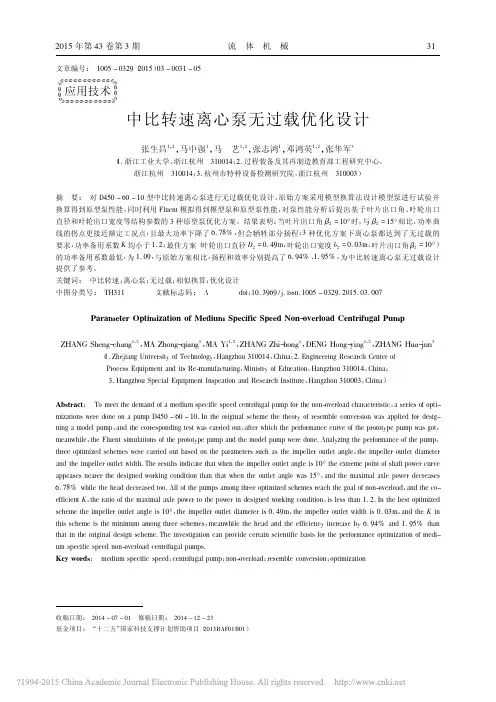
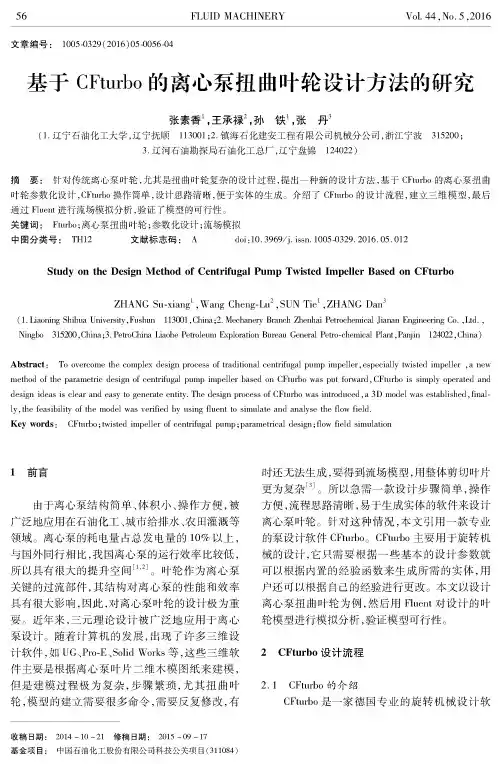
文章编号:1005~0329(2016)05~0056-04基于CFturb◦的离心泵扭曲叶轮设计方法的研究张素香1王承禄2孙铁1张丹3(1.辽宁石油化工大学,辽宁抚顺113001 ;2.镇海石化建安工程有限公司机械分公司,浙江宁波315200;3.辽河石油勘探局石油化工总厂,辽宁盘锦124022)摘要:针对传统离心菜叶轮,尤其是扭曲叶轮复杂的设计过程,提出一种新的设计方法,基于CF tur b o的离心菜扭曲叶轮参数化设计,C F tur b。
操作简单,设计思路清晰,便于实体的生成。
介绍了 C F tur b o的设计流程,建立三维模型,最后通过F lu e n t进行流场模拟分析,验证了模型的可行性。
关键词:F t u b o;离心菜扭曲叶轮;参数化设计;流场模拟中图分类号:T H12 文献标志码:A d o i:10.3969/j.issn.l005~0329.2016.05.012Study on the Design Method of Centrifugal Pump Twisted Impeller Based on CFturboZHANG Su-xiang1,Wang Cheng-Lu2,SUN Tie1,ZHANG Dan3(L L a o n in g Shihua U niversity,F ush un113001,C hina;2.Mechanery B rn c h Zhenhai Petrochemical Jianan Engineering Co.,L td.,Ningbo315200,C h in a;3.PetroChina L a o h e Petroleum Exploration Bureau G n e ra l P etro-chem ica P la n t,P a jin124022,C hina)A bstract:To overcome the com plex design process o f tra d itio n a l c e n trifu g a l pum p im p e lle r,esp ecially tw isted im p e lle r,a newm ethod o f the param etric design o f cen trifug al pum p im p e lle r based on C Fturbo was p u t fodesign ideas is cle a r and easy to generate e n tity.The design process o f C Fturbo was in tro d u c e d,a3D m odel was e sta b lish e d,fin a l-ly,th e fe a s ib ility o f the m odel was ve rifie d by using flu e n t to sim ulate and analyse the flo w fie ld.Key words :C Fturbo;t^visted im p e lle r o f ce n trifu g a l pum p;param e trical design;flo w fie ld sim ula tioni 前言由于离心泵结构简单、体积小、操作方便,被 广泛地应用在石油化工、城市给排水、农田灌溉等 领域。
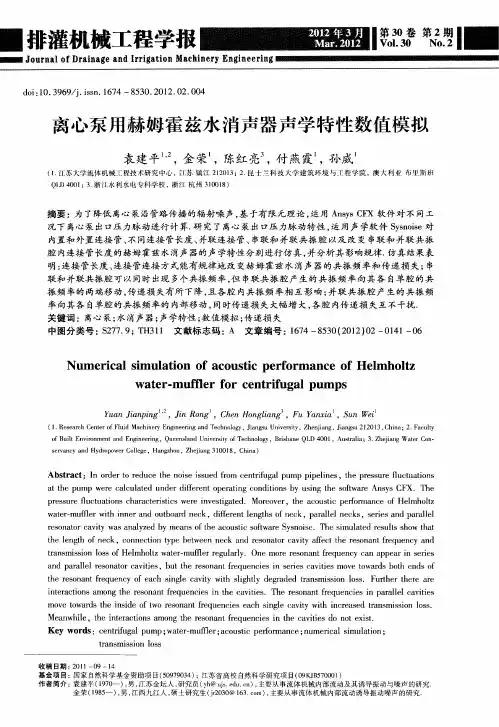
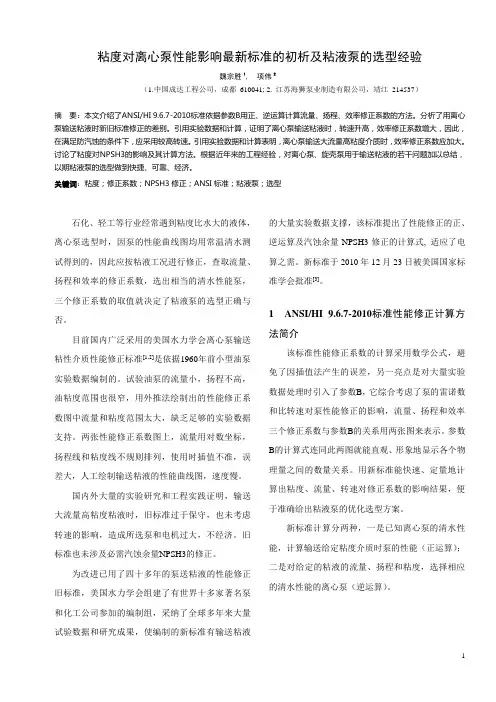
粘度对离心泵性能影响最新标准的初析及粘液泵的选型经验魏宗胜1, 项伟 2(1.中国成达工程公司,成都610041; 2. 江苏海狮泵业制造有限公司,靖江214537)摘要:本文介绍了ANSI/HI 9.6.7-2010标准依据参数B用正、逆运算计算流量、扬程、效率修正系数的方法。
分析了用离心泵输送粘液时新旧标准修正的差别。
引用实验数据和计算,证明了离心泵输送粘液时,转速升高,效率修正系数增大,因此,在满足防汽蚀的条件下,应采用较高转速。
引用实验数据和计算表明,离心泵输送大流量高粘度介质时,效率修正系数应加大。
讨论了粘度对NPSH3的影响及其计算方法。
根据近年来的工程经验,对离心泵、旋壳泵用于输送粘液的若干问题加以总结,以期粘液泵的选型做到快捷、可靠、经济。
关键词:粘度;修正系数;NPSH3修正;ANSI标准;粘液泵;选型石化、轻工等行业经常遇到粘度比水大的液体,离心泵选型时,因泵的性能曲线图均用常温清水测试得到的,因此应按粘液工况进行修正,查取流量、扬程和效率的修正系数,选出相当的清水性能泵,三个修正系数的取值就决定了粘液泵的选型正确与否。
目前国内广泛采用的美国水力学会离心泵输送粘性介质性能修正标准[1,2]是依据1960年前小型油泵实验数据编制的。
试验油泵的流量小,扬程不高,油粘度范围也很窄,用外推法绘制出的性能修正系数图中流量和粘度范围太大,缺乏足够的实验数据支持。
两张性能修正系数图上,流量用对数坐标,扬程线和粘度线不规则排列,使用时插值不准,误差大,人工绘制输送粘液的性能曲线图,速度慢。
国内外大量的实验研究和工程实践证明,输送大流量高粘度粘液时,旧标准过于保守,也未考虑转速的影响,造成所选泵和电机过大,不经济。
旧标准也未涉及必需汽蚀余量NPSH3的修正。
为改进已用了四十多年的泵送粘液的性能修正旧标准,美国水力学会组建了有世界十多家著名泵和化工公司参加的编制组,采纳了全球多年来大量试验数据和研究成果,使编制的新标准有输送粘液的大量实验数据支撑,该标准提出了性能修正的正、逆运算及汽蚀余量NPSH3修正的计算式, 适应了电算之需。
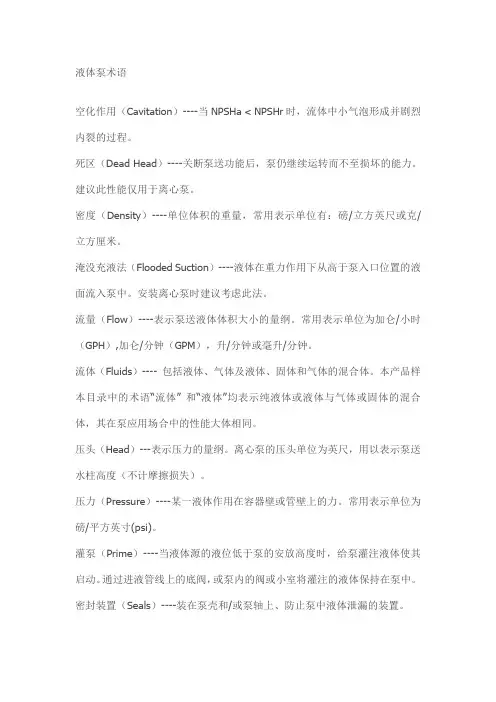
液体泵术语空化作用(Cavitation)----当NPSHa < NPSHr时,流体中小气泡形成并剧烈内裂的过程。
死区(Dead Head)----关断泵送功能后,泵仍继续运转而不至损坏的能力。
建议此性能仅用于离心泵。
密度(Density)----单位体积的重量,常用表示单位有:磅/立方英尺或克/立方厘米。
淹没充液法(Flooded Suction)----液体在重力作用下从高于泵入口位置的液面流入泵中。
安装离心泵时建议考虑此法。
流量(Flow)----表示泵送液体体积大小的量纲。
常用表示单位为加仑/小时(GPH),加仑/分钟(GPM),升/分钟或毫升/分钟。
流体(Fluids)---- 包括液体、气体及液体、固体和气体的混合体。
本产品样本目录中的术语“流体” 和“液体”均表示纯液体或液体与气体或固体的混合体,其在泵应用场合中的性能大体相同。
压头(Head)---表示压力的量纲。
离心泵的压头单位为英尺,用以表示泵送水柱高度(不计摩擦损失)。
压力(Pressure)----某一液体作用在容器壁或管壁上的力。
常用表示单位为磅/平方英寸(psi)。
灌泵(Prime)----当液体源的液位低于泵的安放高度时,给泵灌注液体使其启动。
通过进液管线上的底阀,或泵内的阀或小室将灌注的液体保持在泵中。
密封装置(Seals)----装在泵壳和/或泵轴上、防止泵中液体泄漏的装置。
自吸泵(Self-Priming)----能自行将液面低于泵入口位置的液体抽吸上来(吸升)的泵。
与其相对照的是采用淹没充液的泵。
比重(Specific Gravity)----某一特定体积的液体重量与相同体积的纯水重量之比。
泵送较重的液体(比重大于1.0)时所需的驱动功率也相应增大。
静扬升压头(Static Discharge Head)----从泵入口位置到被扬升流体达到最高点位置的垂线距离,表示单位为英尺。
粗滤器(Strainer)----安装在泵入口处、防止异物进入泵中损坏机件的装置。
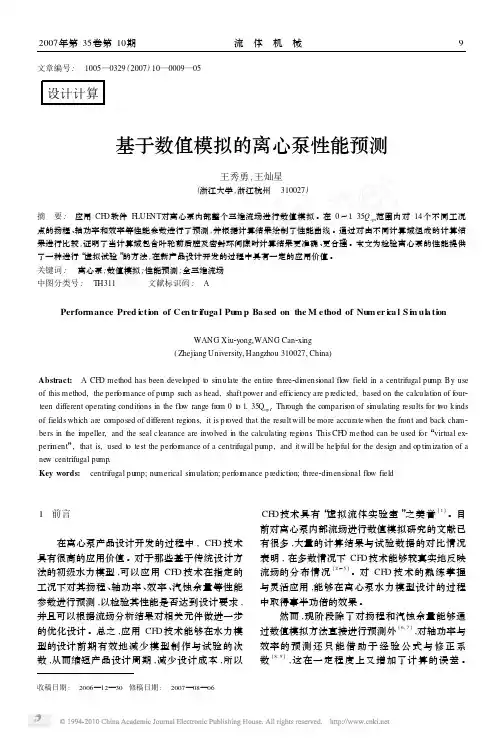
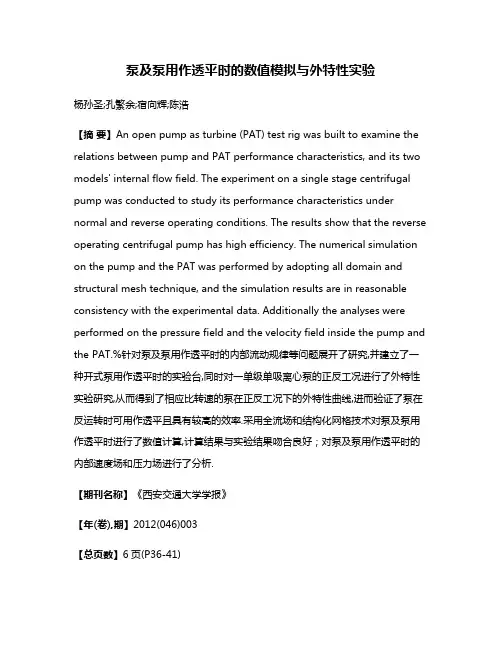
泵及泵用作透平时的数值模拟与外特性实验杨孙圣;孔繁余;宿向辉;陈浩【摘要】An open pump as turbine (PAT) test rig was built to examine the relations between pump and PAT performance characteristics, and its two models' internal flow field. The experiment on a single stage centrifugal pump was conducted to study its performance characteristics under normal and reverse operating conditions. The results show that the reverse operating centrifugal pump has high efficiency. The numerical simulation on the pump and the PAT was performed by adopting all domain and structural mesh technique, and the simulation results are in reasonable consistency with the experimental data. Additionally the analyses were performed on the pressure field and the velocity field inside the pump and the PAT.%针对泵及泵用作透平时的内部流动规律等问题展开了研究,并建立了一种开式泵用作透平时的实验台,同时对一单级单吸离心泵的正反工况进行了外特性实验研究,从而得到了相应比转速的泵在正反工况下的外特性曲线,进而验证了泵在反运转时可用作透平且具有较高的效率.采用全流场和结构化网格技术对泵及泵用作透平时进行了数值计算,计算结果与实验结果吻合良好;对泵及泵用作透平时的内部速度场和压力场进行了分析.【期刊名称】《西安交通大学学报》【年(卷),期】2012(046)003【总页数】6页(P36-41)【关键词】离心泵;泵作透平;实验研究;数值模拟;流场分析【作者】杨孙圣;孔繁余;宿向辉;陈浩【作者单位】江苏大学流体机械及工程技术中心,212013,江苏镇江;江苏大学流体机械及工程技术中心,212013,江苏镇江;江苏大学流体机械及工程技术中心,212013,江苏镇江;江苏大学流体机械及工程技术中心,212013,江苏镇江【正文语种】中文【中图分类】TH322泵是完全可逆式旋转机械,其正向运行时可将旋转机械能转化为液体的压力能,从而实现对液体增压的作用,其反向运行用作透平时,将高压液体的压力能转化为泵轴的旋转机械能,从而实现高压液体能量的开发和利用.泵用作透平时的运行原理与水轮机相似,具有结构简单、体积小、造价低、维修方便、使用广泛、运行可靠等优点,目前在化工领域的余压液体能量回收和小型水利水电资源的开发、利用等广泛应用[1].泵与泵用作透平时的水力特性有所不同,选择合适的泵用作透平还存在一定的难度[2-7].随着计算机技术的发展,应用计算流体动力学(CFD)技术来预测泵在透平工况下的水力特性已成为可能,但已有研究表明,泵在透平工况下的外特性预测与实验结果误差较大[8-10].因此,本文对泵及泵用作透平时的区别和联系进行了研究,并应用CFD技术预测了泵在透平工况下的外特性.1 实验台泵工况的测试在江苏大学流体机械质量技术检验中心进行,实验台精度等级为一级.图1a为开式泵实验台,图1b为江苏大学流体机械实验室建设的开式泵用作透平(下文中称透平)时的实验台.高压泵可为输送液体增压,高压液体冲击透平叶轮使之旋转,而负载泵会消耗透平回收的能量,所以调节负载泵的流量可以控制透平的转速,使之在额定转速的范围内.通过测量透平的进出口压力、扭矩、转速、流量等参数,可以计算出透平的扬程、轴功率和效率.扭矩仪和流量计的测量误差分别为±0.2%和±0.5%,压力表精度等级为0.4级.2 泵的主要参数研究对象为普通蜗壳式清水离心泵,其泵工况设计参数为:流量50 m3/h,扬程18 m,转速1 500 r/min,比转速78.表1列出了泵的主要几何参数.图2为实验现场和实验叶轮.图1 泵及泵用作透平时的实验台表1 泵的主要几何参数叶轮叶轮进口直径D 1/mm 102叶轮口环长度L/mm15叶轮口环间隙γ/mm 0.95进口安放角β1/(°) 39出口安放角β2/(°)25叶片形状圆柱形叶片数z 6叶轮出口直径D 2/mm 235叶轮轮毂直径D h/mm 30叶轮出口宽度b2/mm 15.14蜗壳蜗壳基圆直径D 4/mm 266蜗壳进口宽度b3/mm 26蜗壳出口直径D 5/mm 65蜗壳断面形状圆形3 数值计算3.1 几何造型在数值计算中,通常不考虑离心泵前后泵腔中的流体(见图3a),因此数值计算结果不包括容积损失和圆盘摩擦损失.容积效率和机械效率是先用经验公式来估算,再对计算结果进行修正[11].文献[8-9]利用这种方法对透平进行了数值计算,但未得到理想的结果,因此本文采用全流场进行了数值计算(见图3b).3.2 网格生成离心泵前后腔存在着较小的间隙,用非结构网格很难加以处理,因此本文采用结构化网格对过流部件进行了六面体结构划分,边界层网格y+≥40.图4为叶轮流道及全流场网格.图2 实验现场和实验叶轮图3 数值计算中的简化流场和全流场图4 叶轮流道及全流场网格图5 为透平的效率与网格数的关系.从图5可以看出,随着网格数的增加,透平的效率逐渐增大,当网格数大于100万时,效率的变动范围小于0.5%,因此网格数大于100万时较为合适.本文计算时的蜗壳、叶轮、前腔、后腔、出水管的网格数分别为479 710、378 222、134 956、129 700、174 720,网格总数为1 297 308.图5 透平的效率与网格数的关系3.3 参数设置采用ANSYS-CFX流场分析软件对泵及透平的内部流动进行了求解和分析.进口边界条件为静压进口,出口条件边界为质量出口[12].通过调节出口的质量流量可以获得泵及透平的外特性曲线.计算时,计算收敛精度为10-6,壁面粗糙度为50μm,输送介质为25℃的水,湍流模型为k-ε湍流模型,分析类型为稳态分析,过流部件的动静结合部位采用转子-定子接口(rotor-stator interface)连接,静止过流部件采用通用网格接口(general grid interface)连接.4 泵及透平的实验结果比较图6为泵及透平的实验结果比较.表2为泵及透平在最高效率时的特性参数.从图6可以看出:泵的扬程随着流量的增加逐渐减小,轴功率随着流量的增加逐渐增大;透平的扬程和轴功率均随流量的增加逐渐增大;透平的流量效率曲线在最高效率点之前比较陡峭,在最高效率点之后比较平坦.根据透平的流量效率曲线可知,透平最好在大流量区域运行,当系统流量减少时,透平的效率不会迅速下降,甚至成为负载.由表2可知,最高效率点透平的流量、扬程、轴功率、比转速分别是泵的1.66、1.89、1.19、0.8倍,透平的效率比泵降低了3.1%.图6 泵及透平的实验结果比较表2 泵及透平在最高效率时的特性参数注:n s为比转速.实验对象 Q/m3·h-1 H /m P shaft/k W η/% n s泵51.71 17.17 3.83 63.08 77.79透平86.14 32.404.56 59.98 62.365 实验与数值计算结果比较图7为泵特性的实验和数值计算结果.表3为不同流量下泵的效率、扬程和轴功率. 图7 泵特性的实验与数值计算结果表3 不同流量下泵的效率、扬程和轴功率注:Q BEP为最高效率点流量.Q·Q-1BEP 0.70 0.84 1.00 1.11 1.33 η/%H/m P shaft/kW实验58.27 62.6863.08 62.59 58.82模拟 59.13 62.64 64.07 64.14 60.81相对误差 1.48-0.061.57 1.64 3.28实验19.31 18.47 17.17 16.03 14.13模拟 18.32 17.74 16.89 16.09 14.01相对误差 -5.13-3.95-1.63 0.02-0.85实验3.23 3.48 3.83 4.05 4.49模拟 3.05 3.36 3.71 3.94 4.31相对误差-5.57-3.45-3.13-2.72-4.01从图7和表3可以看出,泵的计算结果与实验结果比较接近.从中还可以看出:效率在大流量时的相对误差较大,最大值为3.28%;扬程在小流量时的相对误差较大,最大误差为5.13%;轴功率在小流量和大流量时的相对误差均比较大,最大值为5.57%.可见,效率和扬程的计算结果较为准确,特别是在最优工况附近,计算值的相对误差最小,而在小流量和大流量附近,计算值的相对误差较大.图8为透平特性的实验与数值计算结果.表4为不同流量时透平在全流场下的效率、扬程和轴功率.图8 透平特性的实验与数值计算结果从图8可以看出,忽略前后泵腔时的数值计算结果与实验结果差异较大,全流场的数值计算结果与实验结果比较接近,这说明,进口流动状态对透平性能的影响较大,因此在数值计算过程中必须考虑前后泵腔中的流体,这样才能较为准确地预测透平的特性.表4 不同流量时透平在全流场下的效率、扬程和轴功率注:Q BEP为最高效率点流量.Q·Q-1BEP 0.81 0.90 1.00 1.14 1.27 η/%H/m P shaft/kW实验52.25 56.31 59.98 58.80 56.70模拟 56.14 60.67 63.03 62.18 60.13相对误差 7.44 7.74 5.09 5.74 6.05实验24.79 27.96 32.40 38.85 47.27模拟 25.42 29.1633.71 40.43 49.24相对误差 2.54 4.29 4.04 4.07 4.17实验2.47 3.33 4.56 6.20 8.29模拟 2.72 3.74 4.98 6.70 8.87相对误差10.12 12.31 9.21 8.06 7.00从表4可以看出,采用全流场计算时,透平在最高效率点的效率、扬程、轴功率的CFD预测值与实验值的相对误差分别为5.09%、4.04%、9.21%.小流量时的效率相对误差较大,最大为7.74%,扬程的最大相对误差为4.29%,轴功率的最大相对误差为12.31%.可见:数值计算可以较为准确地预测透平的流量效率和扬程,在设计工况附近,预测值的相对误差最小,而在小流量和大流量附近,预测值的相对误差较大.数值计算结果大于实验结果的原因是,计算中忽略了轴承和机械的密封摩擦引起的损失,也未考虑平衡孔泄露引起的容积损失.6 内部流场分析6.1 压力场分布图9、图10分别为不同流量下泵和透平在z=0平面上的静压力p s分布.从图9可以看出:泵的静压力从叶轮进口到蜗壳出口是逐渐增加的,泵的压力最低点出现在叶轮进口的背面;叶轮进口与蜗壳出口的压差随着流量的增加逐渐减小,这与泵的扬程随着流量的增加而降低相吻合;蜗壳的几何结构不对称造成了叶轮各个流道内的压力分布不对称,这种压力分布的不对称性是叶轮径向力产生的原因. 图9 不同流量下泵在z=0平面上的静压力分布图10 不同流量下透平在z=0平面上的静压力分布从图10可以看出:透平的静压力从蜗壳到叶轮是逐渐减小的,压力最低点出现在叶轮出口的背面;透平内部压差随着流量的增加逐渐增大,这与透平的扬程随着流量的增加而增加相吻合;叶轮各流道的压力分布不完全相同,这种压力分布的不对称性也会对透平叶轮产生径向力,因此蜗壳几何结构的不对称性造成了蜗壳式离心泵在正反工况下均存在径向力.6.2 速度场分布图11 泵及透平的速度场分布图11 为泵及透平的速度场分布.从图11可以看出:泵的速度分布比较均匀,叶轮出口位置存在射流尾迹现象;透平的流场分布较为紊乱,在叶轮的背面和工作面进口处分别存在着2个旋涡区域.靠近叶轮背面的旋涡,其旋转方向与叶轮相同;靠近叶轮工作面进口处的旋涡,其旋转方向与叶轮相反.7 结论本文采用数值计算与实验相结合的方法对一台单级、单吸离心泵用作泵和用作透平时进行了研究,并为此建立了开式泵用作透平的实验台,从而验证了离心泵完全可以在透平工况下稳定运行且具有较高效率的事实,同时获得了比转速为78的泵在透平工况下的特性曲线,以及在最高效率点的扬程、流量和轴功率换算系数,其可为泵用作透平时的设计和性能预测提供参考.采用全流场和结构化网格对泵在正反工况下进行了数值计算与分析,结果表明:数值计算对泵效率的预测较为准确,最大相对误差小于3.5%;对透平效率的预测误差较大,最大相对误差小于8%;数值模拟对泵和透平在最优工况下的特性预测较为准确.在正反工况下,对泵的压力场随流量的变化进行了分析,根据压力场分布规律对泵及泵用作透平时的外特性进行了合理的解释.由透平速度场分析表明,透平叶轮的速度分布较为紊乱,在透平的叶片背面和工作面均存在旋涡区域,靠近叶轮背面的旋涡,其旋转方向与叶轮相同,靠近叶轮工作面进口处的旋涡,其旋转方向与叶轮相反.【相关文献】[1] WILLIAMS A.Pumps as turbines used with induction generations of stand-alone micro-hydroelectric power plants[D].Nottingham,UK:Nottingham Polytechnic,1992. [2] AMELIO M,BARBARELLI S.A one-dimensional numerical model for calculating the efficiency of pumps as turbines for implication in micro-hydro power plants[C]∥7th Biennial ASME Conference Engineering Systems Design and Analysis.New York,USA:ASME,2004:1-8.[3] DERAKHSHAN S,NOURBAKHSH A.Experimental study of characteristic curves of centrifugal pumps working as turbines in different specific speeds[J].Experimental Thermal and Fluid Science,2008,32(3):800-807.[4] WILLIAMS A A.The turbine performance of centrifugal pumps:a comparison of prediction methods[J].Proc Instn Mech Engrs,1994,208:59-66.[5] SINGH P,NESTMAN F.An optimization routine on a prediction and selection model for the turbine operation of centrifugal pumps[J].Experimental Thermal and Fluid Science,2010,34(2):152-164.[6] CHAPALLAZ J M,EICHENBERGER P,FISCHER G.Manual on pumps used as turbines [M].Berlin,Germany:Verlag,1992:21-29.[7]杨军虎,袁亚飞,蒋云国,等.离心泵反转作为能量回收透平的性能预测[J].兰州理工大学学报,2010,36(1):54-56.YANG Junhu,YUAN Yafei,JIANG Yunguo,etal.Performance predictions of reversed centrifugal pumps working as energy recovery turbines[J].Journal of Lanzhou University of Technology,2010,36(1):54-56. [8] DERAKHSHAN S,NOURBAKHSH A.Theoretical,numerical and experimental investigation of centrifugal pumps in reverse operation [J].Experimental Thermal and Fluid Science,2008,32(5):1620-1627.[9] SINGH P.Optimization of the internal hydraulics and of system design for pumps as turbines with field implementation and evaluation [D].Karlsruhe,Germany:University of Karlsruhe,2005.[10]WILLIAMS A.Pumps as turbines users guide[M].London,UK:International Technology Publications,1995:35-62.[11]杨孙圣,孔繁余,周水清,等.离心泵汽蚀性能的数值计算与分析[J].华中科技大学学报,2010,38(10):93-95.YANG Sunsheng,KONG Fanyu,ZHOU Shuiqing,etal.Numerical simulation and analysis of centrifugal pump cavitation characteristics [J].Journal of Huazhong University of Science and Technology:Natural Science Edition,2010,38(10):93-95.[12]SPENCE R,AMARAL-TEIXEIRA J.Investigation into pressure pulsations in a centrifugal pump using numerical methods supported by industrial tests[J].Computer and Fluids,2008,37(6):690-704.。
Http:^ Vol.62,2020,No.6Chinese Journal of Turtxjmachinery 考删性鹤瞬性的离心力券析太兴宇李凯华李云孟继纲肖忠会李健伟(沈阳鼓风机集团股份有限公司)摘要:API617标准中规定,如果基础结构刚度在0-150%最大连续转速范围内大于轴承刚度的3.5倍,则在动力学计算中不需要考虑弹性基础的影响,反之则需要在动力学模型中加入弹性基础特性。
目前很多实际应用的旋转机械都忽略了基础刚度的影响,这就导致一些机组的临界转速预估误差较大,使得转子在运行过程中振动过大。
本文通过对压缩机轴承区进行动刚度测试,从而得到压缩机基础刚度的实测数据,并以多项式传递函数的形式,将弹性基础的特性引入到转子系统中。
通过对转子系统横向振动的分析,得到基础特性的影响规律。
分析结果表明基础特性会影响转子的动力学分析结果。
关键词:转子动力学分析;弹性基础特性;动刚度测试;传递函数;临界转速中图分类号:TH452;TK05文章编号:1006-8155-(2020)06-0057-07文献标志码:A DOI:10.16492/j.坊s.2020.06.0007Rotordynamic Analysis of Centrifugal Compressor Considering Elastic Support CharacteristicsXing-yu Tai Kai-hua Li Yun Li Ji-gang Meng Zhong-hui Xiao Jian-wei Li(Shenyang Blower Works Group Corporation)Abstract:According to API617standard,if the dynamic stiffness of the foundation structure is greater than3.5times the bearing stiffness within the range of0-150%maximum continuous speed,the influence of the elastic suppout doesn't need to consider in the dynamic calculation,otherwise,elastic support characteristics should be considered in the dynamic model.At present,the influence of foundation stiffness is often ignored in many practical rotating machineries,which causes large errorin the prediction of critical speed and large rotor vibration in the process of operation.In this paper,the support dynamic stiffness were measured at the bearing locations and the support characteristics were considered in the rotor system using polynomial transfer functions extracted from the measured data.The effect of elastic support was obtained by rotor vibration analysis.The results show that the characteristics of support can affect the rotordynamic analysis results.KsyWOrdS:Rotordynamics,Elastic Support Characteristics,Dynamic Stiffness Test,Transfer Functions,Critical Speed*基金项目:国家自然科学基金-联合基金项目(U1808214)・57・0引言API617皿中规定,当支撑结构的刚度值(来自于轴承座、底座和混凝土基础)高于轴承刚度的3.5倍时,可以不考虑其影响。